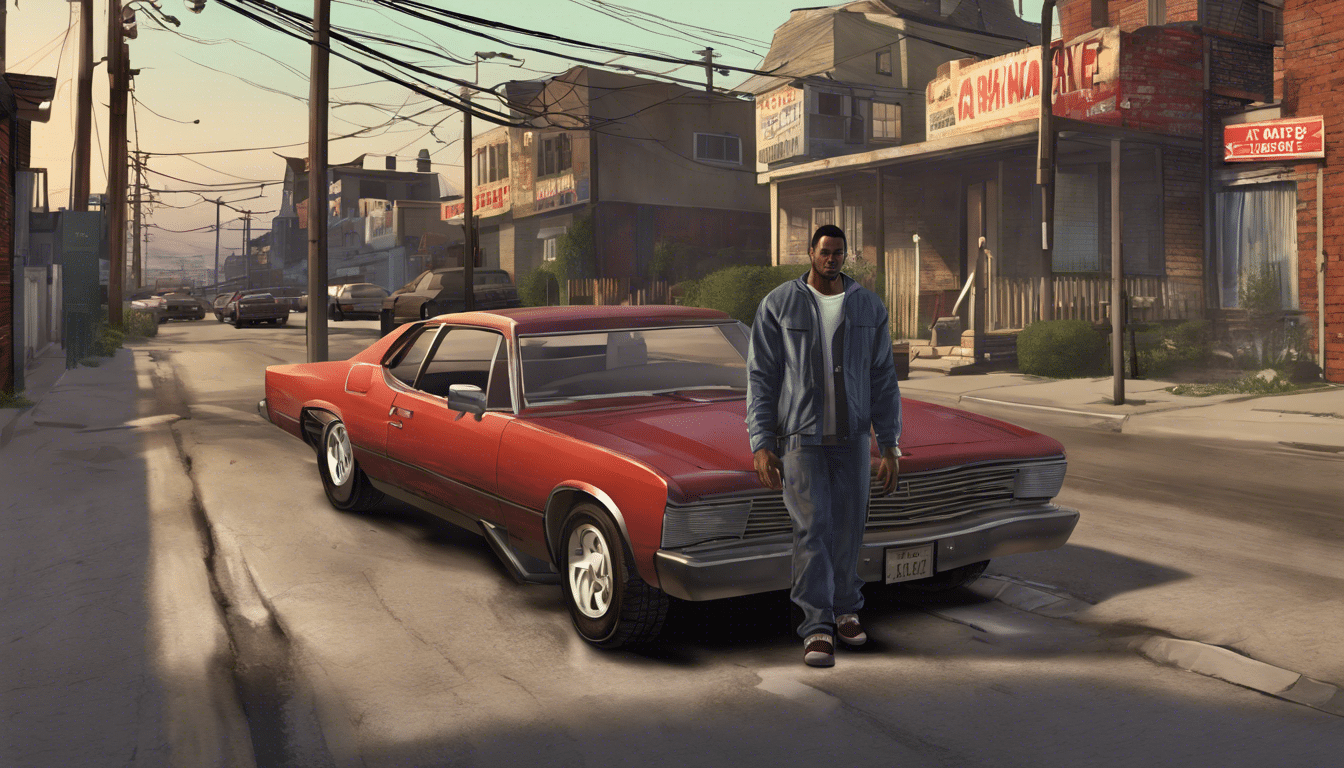Discover in this article a captivating dive into the dark and controversial universe of the GTA franchise, where the streets transform into a real nightmare. Follow us for an in-depth analysis of this iconic game on the border between fiction and reality.
Negative influence on young minds
Violence and antisocial behavior
Video games like Grand Theft Auto are often singled out for their crude depiction of crime and violence. For young minds, this continued exposure to acts of brutality can harm their psychological development. Playing games where theft, robbery and betrayal are glorified can trivialize these behaviors, creating a dangerous confusion between reality and fiction.
Influence on moral values
In the Grand Theft Auto universe, players navigate a world where criminal acts are often rewarded. This distortion of moral values can have profound repercussions on young players, forming a false perception of the real consequences of their actions. The game suggests that material gains take precedence over moral integrity, a worldview that can be toxic.
The impact on the school system
Fascination with criminal behavior in video games can also disrupt young people’s concentration at school. Exciting and immersive scenarios can distract from studies and school responsibilities. This enthusiasm for the virtual world often pushes them to neglect their duties and become disinvested in their education.
Socialization and isolation
Although some video games provide platforms for online socialization, games focused on crime can encourage deeper isolation. Young people can retreat into fictional worlds, losing touch with reality. This social isolation harms their interpersonal skills and their ability to interact healthily with others.
Consumption of media content
It is crucial to understand that video games are a part of the broader set of media content consumed by young people. According to a study on the effects of television on your behaviors, media can profoundly influence our actions and perspectives. The same goes for games which, by their interactive nature, can have an even more direct and powerful impact.
Control strategies
Parents and educators must be vigilant regarding the consumption of these games by young people. Implementing age restrictions and controlling screen time can be effective measures. It is also relevant to encourage open discussion on the differences between reality and fiction, thus helping young people to develop a critical sense of media content.
Given the potentially harmful effects of violent video games, it is essential to promote positive and constructive alternatives. These could include educational games or even non-digital activities that promote the personal and social development of young people.
A rise in urban violence?
The causes of the increase in urban violence
Why does crime in cities keep increasing? Several factors contribute to this worrying trend. First, social and economic inequalities exacerbate tensions. Disadvantaged neighborhoods, where work opportunities are rare and prospects for improving life limited, become breeding grounds for delinquency.
Then, the disintegration of family and community structures creates a vacuum that gangs and other criminal groups are eager to fill. The loss of reference points and moral support pushes some individuals to seek refuge in antisocial behavior.
The impact of gangs and illicit trafficking
Gangs are no longer content with restricted territories; they extend their influence over vast urban areas. Drug and arms trafficking accentuates this escalation of violence. These organizations use increasingly sophisticated means to evade the law, transforming certain cities into veritable battlefields.
Score-settling between gangs, attacks on law enforcement and intimidation of residents have become commonplace. This situation creates a climate of permanent fear and insecurity, paralyzing daily activities.
The social consequences of this insecurity
The anxiety generated by this increase in violence has profound repercussions on community life. Residents of affected neighborhoods limit their movements, avoid certain places and live in constant worry. The quality of life is significantly affected.
Local businesses are also suffering. Entrepreneurs are hesitant to invest in high-risk areas, while those already in place see their businesses decline due to crime and insecurity. This negative spiral leads to a further deterioration of living conditions.
Solutions and initiatives to counter the increase in crime
Different strategies are being put in place to try to stem this wave of violence. Law enforcement is strengthening its presence in sensitive areas and intensifying its operations against gangs. The importance of prevention and education is also highlighted to dissuade young people from joining criminal groups.
A holistic approach involving social services, employment and reintegration programs, as well as community initiatives aims to rebuild the social fabric of affected neighborhoods. For example, in medium-sized French towns, efforts are being made to stop trafficking and associated violence, by strengthening collaboration between the police and citizens.
The importance of collective vigilance
For efforts to combat urban crime to be effective, everyone’s participation is crucial. Citizens must remain vigilant and participate in local initiatives. Collaboration between residents, local authorities and law enforcement is essential to restore a climate of safety.
By cultivating a united, proactive community, it is possible to resist rising violence and restore peace to the streets. Neighborhoods where everyone feels responsible and acts together are better equipped to face the challenges posed by urban crime.
When the game reflects reality
The reflection of dark urban life
Grand Theft Auto (GTA) is more than just entertainment; it’s a window into the darker aspects of urban life. Players immerse themselves in a world where crime reigns supreme, gangs vie for power, and the law is often powerless. This brutal realism makes GTA a street nightmare, while providing an incisive critique of modern society.
Violence: a distorting mirror?
The pervasive violence in GTA isn’t just gratuitous; it reflects, although in an exaggerated way, urban realities. From bank heists to score-settling, every gameplay element is carefully crafted to replicate the chaos and anarchy of the streets. Debates rage around the following question: do video games make you violent? Studies show that the link between violent games and aggressive behavior is complex and controversial.
Organized crime: from fiction to reality
GTA also explores the more organized dimension of crime. The protagonists are not simple delinquents, but seasoned criminals, often involved in complex networks of drug trafficking, money laundering and political corruption. These scenarios often find disturbing echoes in reality, reminiscent of famous criminal cases that hit the headlines.
A critical look at society
Beyond the adrenaline and chaos, GTA offers a sharp satire of contemporary society. Every mission, character, and interaction in the game serves to critique specific aspects of modern life, whether it’s corporate greed, political corruption, or social inequality. In this sense, the game pushes players to think about the dysfunctions of our world, while entertaining them.
Immersion and escapism
For video game enthusiasts, GTA provides total immersion in a gripping virtual world. The game’s ability to recreate an alternative society, where players can experience extreme and exciting scenarios, largely explains its success. This immersion allows you to explore facets of nightlife, illegal races and power struggles, providing a temporary escape from the challenges of everyday life.
Do part of it
It is crucial for players and critics to distinguish between the virtual world of GTA and everyday reality. If the game can reflect certain realities in a dramatic way, it remains above all a work of fiction. The key lies in responsible consumption, being aware of potential influences and always keeping a critical eye on what the game conveys.
In short, GTA, with its unique blend of adventure, danger and social satire, immerses us in a hyper-realistic and often nightmarish version of urban streets, while highlighting the complexities and contradictions of crime and modern society. For some, it’s just a game; for others, it is a profound and impactful commentary on the human condition.
The psychological consequences of video games
The effects of immersion in violent video games
Immersive video games like Grand Theft Auto immerse players in urban environments where violence, crime and struggles for power are omnipresent. This immersion can have significant psychological effects. Prolonged exposure to violent scenarios can desensitize players to real-world violence, reduce empathy, and increase aggression. These changes are not anecdotal; Various studies have shown a correlation between violent video games and more aggressive behavior among adolescents and young adults.
The influence on the perception of reality
The impact on mental health
The confusion between virtuality and reality
Another psychological danger is the confusion between the virtual world and the real world. Players can begin to adopt behaviors approved and rewarded in the game in real life. The barrier between reality and fiction blurs, which can lead to unfortunate incidents. Showing empathy or understanding the consequences of one’s actions becomes more complex when the line between the virtual world and reality is thin.
Social repercussions
Finally, the social repercussions of immersion in violent video games are notable. Isolation, loss of real social connections, and preference for virtual interactions can turn an innocent pastime into a social problem. Antisocial behaviors, such as cyberbullying, increase as players spend more time in worlds where violence is a normalized means of interaction.
In sum, the psychological dangers of video games on crime are not limited to immediate effects such as increased aggression, but encompass a series of complex problems including the distortion of reality, impacts on mental health and social repercussions. Attention and moderation are essential to prevent these entertainments from becoming a threat.






Leave a Reply